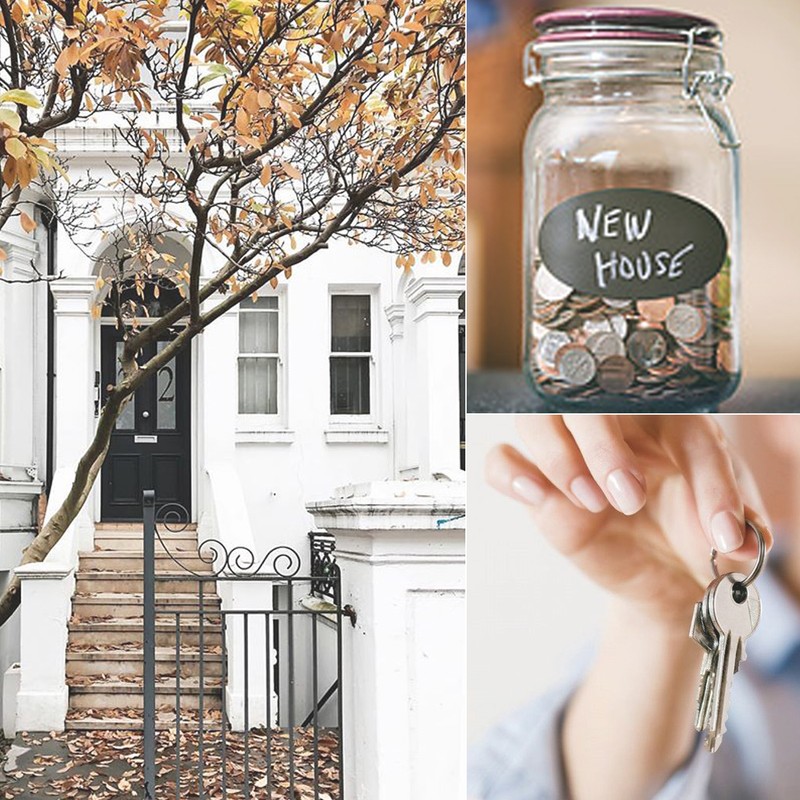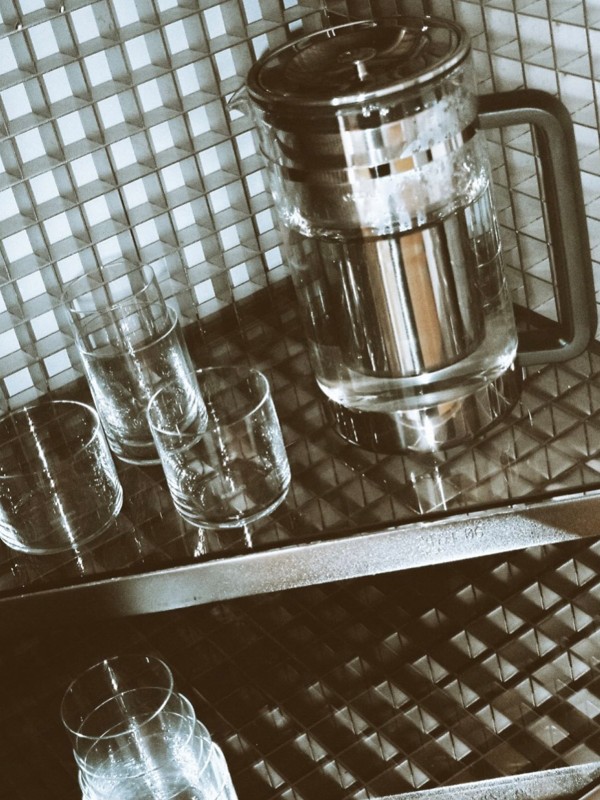These 3 Women Bought Homes In London – Here’s How
GOING IT ALONE: Jade Vanriel
Product manager and interiors blogger Jade was just 23 years old when she bought her first home in Essex. Through hard work and constant saving from a young age, Jade was able to put down a 20% deposit without any help from the government or her family.
Have you always been a saver?
Yes! I’ve been saving since I had my first job at Sainsbury’s aged 16. I was just so excited to finally be able to work and earn some money for myself.
What age did you start saving for your first property?
I’ve always saved, but not with any real intention to buy a home until I went to university, where I studied law. Ultimately, I decided becoming a lawyer wasn’t for me, and instead of continuing my studies I got a job in publishing in order to ramp up my savings and buy a home.
Were you saving at university? How did you do it?
Yes, I worked throughout university – every year I would get a new retail job, and I also worked at Harrods every summer whilst back in London.
How much deposit did you put down?
I put down 20% of my property price.
Did you have a particular technique for saving?
The main thing I did was open up different savings accounts, and set up standing orders for money to automatically go out to these accounts before I could even see it. I also stopped buying clothes and getting my nails done. Everything became very DIY – I also stopped buying lunches every day and meal prepped instead. I was determined to accomplish my goal ASAP so I did everything I could and saved everything after my travel, living expenses and food was covered.
Did you have to miss out on a lot of things that your friends were doing? Do you ever regret missing out on those experiences?
Absolutely – sacrifice is so necessary! But I don't regret it at all. Many of my friends didn't understand what I was trying to do and many just stopped inviting me out, but now they completely understand. Now they ask me for advice and tips!
Did you use a help-to-buy scheme or shared ownership?
No, I didn't use any schemes. I saved for a full deposit and did it that way. I suppose I was fortunate enough to have started saving so early that my earnings and credit score were great. I didn't need a scheme at the time.
Were there any Isas or saving accounts you found particularly helpful?
I really liked my Virgin Money ISA as it penalises you when you take money out, which meant I was definitely not touching my money! I wasn’t able to use my help-to-buy Isa though – I found a property so soon after it was available, I didn't have my money in it for long enough.
How much research was involved? What kind of things did you research?
I researched a lot, pretty much every day in fact. Saturday was my viewing day for many months. I would research commutable areas from London, house prices, what I could get in my budget, future plans in areas, and travel prices.
Did you find everything was made clear by the experts when explaining how the buying process works?
My mortgage broker made things very clear and simple, so that was very helpful. As somebody who loves property and has a legal background, I was very familiar with most of the things that I came across, and when I wasn't I would just Google the terms and processes I didn’t understand.
What do you think is the biggest misconception people have about buying their first place?
That it's impossible! And also, that they won't have a life. I have a life!
How did you cope with things like legal fees and stamp duty – did you factor that into your saving?
Yes – as I always say to my followers, I over-saved for these things. It’s really important to do so as there’s so many things that can pop up when you least expect it.
What about furnishing the house when you actually bought it? Had you also factored these costs into your saving?
Yes, I factored this all in. I furnished each room bit by bit as I was doing this alone. Some things were new and many were DIY, like my TV stand, which I found and painted white. I also saved a lot on labour because my dad knows a thing or two about flooring, drilling and electrical. I still have my bathroom to renovate!
Do you think the government making it easy or hard for first-time single buyers?
I think the schemes provided are intended to make things easier and the conversations are becoming louder which is great. But we are constantly bombarded with headlines and stories that say it's impossible, which is why I had to share my experience – to show young people that, no matter how hard it will be, it can certainly happen.
What sort of job do you do?
At the time I was working in legal publishing.
Were there any options other than to save from scratch by yourself?
No. I was taught by my father from a young age to always save my money, so I was in a position to go it alone. But this was down to many years of saving.
What would you change if you could do it again?
Nothing. I have learnt so much. My experience gave me a purpose and a passion, and my career is unfolding in a way I would never have expected three years ago!
Are you tempted to start saving for a second property?
I already have! I'm addicted to it all and cannot wait to build my portfolio of properties.
HELP-TO-BUY ISA & MORTGAGE GUARANTEE: Faye Oakenfull
Marketing Manager Faye Oakenfull, now 29, was able to buy her first home in East Croydon with her partner Ben when she was 25, using a help-to-buy Isa and a mortgage guarantee scheme. The pair were able to save the 5% deposit needed to buy their property in just a year.
When did you and your partner start saving for your first property?
We started saving a little when we were 25, but we didn't know then what we were saving for. We got engaged, but decided our priority was getting on the property ladder rather than getting married. We then saved really hard for a year and we moved in just before my 27th birthday.
Have you always been a saver?
I've never been a saver! I've always been in and out of my overdraft, but my partner Ben is a real saver, so he taught me how to budget, pay myself weekly and split my money into pots. It changed the way I see my money completely.
Did you have any particular techniques for saving the 5%? Did you split it evenly?
Not really. We just agreed that we'd sacrifice everything for a year. We stopped eating out completely, we didn't go on holiday that year and we agreed our birthday presents to each other would be the flat. I also sold everything I didn't want or need from my wardrobe. We set mini goals each month of what we could save between us, that really helped!
Is your property a new build?
No, it’s a 1930s maisonette. It was a complete fixer-upper.
Were you renting a place at the time?
Yes, we were renting a tiny one-bed near Clapham Junction.
How much did you put down?
We put down £14,000, but we saved more to pay for fees, stamp duty, furniture and flat renovations.
Have either of you ever had any problems with a bad credit score which could have stopped you buying?
No, neither of us have. We did, however, download Clearscore when we started saving and we followed the guidance on there to help increase our credit score. We both did and it was surprisingly easy!
Where did you hear about the help-to-buy Isa?
Someone at work told me about it. It came out a few months after we started properly saving so we both got one.
Did you find the bank/mortgage advisors/surveyors/solicitors were clear when explaining everything to you?
We're particularly lucky because my step-dad is a financial advisor, so he helped with everything. I found it stressful dealing with the solicitors because they don't keep you in the loop and you're constantly chasing them to do things.
Why did you choose help to buy over saving the 10% yourselves?
We decided that for us, waiting another year to save another £14,000 didn't make sense. We didn't want to sacrifice our lifestyle for another year, so we decided to take the higher interest rate with a 5% deposit and move as soon as possible. We figured paying a mortgage (even with higher interest) instead of rent for another year made sense and in that year we could add value to a property.
Have there been any downsides to using a help-to-buy Isa or mortgage guarantee scheme?
There were no downsides to the Help to Buy ISA apart from the fact our solicitor charged us an additional fee to ‘deal’ with it. The downside of a Mortgage Guarantee Scheme is that you pay a higher interest rate than if you have a 10% deposit and you have less choice when it comes to lenders. [Mortgage Guarantee Schemes were scrapped in December 2016].
Have there been any downsides to the 5% deposit?
We went for a two-year fixed because we had intended on moving to our next property after the first two years were up, but we're actually waiting another year now. The repayments have gone up by about £100 a month now that we're out of that fixed period. Our mortgage is still less than the rent we paid in Clapham so to us, it still doesn't matter!
How much research was involved in your decision to use a Help to Buy scheme and 5% deposit?
We didn't research in terms of seeking anyone’s advice or seeing what people were saying online. We just looked at the numbers and other scenarios and decided that was best for us.
Do you think the government is making it easy for first-time buyers or do you think their schemes don’t help much in the long run?
I think the help-to-buy schemes are great - some better than others. But I think the government need to do more to help first-time buyers in London. We paid £4000 in stamp duty, which is actually more than a quarter of our deposit (although I know that first-time buyers no longer have to pay this, which is great). I don't think anyone really talks about how difficult it is to move to the next bracket and buy your second place – we're saving for that next step the same way we saved for our first, but it'll actually be harder. That's why a lot of people end up moving out of London.
What do you and your partner do for work? What sort of wage bracket are you in?
Ben is a UX Developer and I'm a Marketing Manager – although we're both working on a little side project called Click Clique. Ben works freelance so it’s not easy to say exactly, but at the time I think I was on £25k and Ben £50k.
Could you have borrowed from family?
It wasn't really an option for us. I'm sure had we asked they might have helped, but we really didn't want to ask. We both felt strongly that we wanted to do this for ourselves and didn't want to owe anyone anything.
What would you change if you could do it again?
I don't think we'd change anything - we both feel like we made the right decision to get on the property ladder quickly. I'm sure Ben would say that if he knew the amount of work involved in doing up an entire flat when we signed for it, he'd reconsider!
What are your travel costs like?
We had a spreadsheet to calculate travel/council tax per area which helped us determine our budget for mortgage (we used it when renting too). That sounds super organised but we’ve been stung before with cheaper rent and an increase in travel and council tax. Now there’s only a £40 difference in what I spend on travel.
Did you consider any other kinds of schemes?
We did look into shared ownership but we didn't want a new build – we wanted we could do something up. Plus, we didn't want to feel tied into anything so we just felt it wasn't right for us.
Were there any extra, unforeseen costs involved with buying your home?
Only the extra fee the solicitor charged us for our help-to-buy Isas. Everything else we were expecting.
What do you think it the biggest misconception young people have about buying their first place?
I think the biggest misconception is that young people can't buy their own property without help – £14k isn't a big deposit in the grand scheme of things and for that we have a two-bed flat with a garden in zone five. There are people we know (who earn more than we did then) who are still renting and talk about how impossible it is, but a lot of people don't want to change or lose their lifestyle. Absolutely fine if you don't want to sacrifice anything, but it will take you longer. If we hadn't had a year of saving as hard as we did, then it might have taken us two or three years to get to the same position. We'd never change that year of being boring because we have our own place and our lifestyle back.
What advice would you give to people trying to get on the property ladder?
I think the only other things I'd recommend is using a mortgage broker that doesn't charge you a fee but earns commission from the mortgage lender (look outside of London for the fee-less ones). They'll do all of the work and get you the best deal which will save you so much time and stress. I'd also recommend using a solicitor that is based outside of London too, the fees are cheaper and you get exactly the same service everywhere.
SHARED OWNERSHIP SCHEME: Emma Gilbert
Emma, 32, who works in the insurance industry, was able to buy a 40% share of a one-bed flat in Dalston using the help of housing association Network Homes. With a 5% deposit on her £180k share of the property, Emma was able to buy in an up-and-coming area on her own using a shared ownership scheme.
When did you start saving for your first property?
I was saving for around a year and was lucky to receive some financial support from my family for the deposit.
Where did you hear about shared ownership? What attracted you to this option?
I first read about it in the press and then started to do some research online. It’s becoming increasingly popular now, so it’s quite easy to find the info you need. Having rented in east London I was desperate to remain here, and shared ownership was only way to make that happen.
Did you find everything was made clear to you about how the process of shared ownership worked?
I had a seamless experience from application to completion, and any queries I had were answered promptly.
Does the fact that you own the minority share mean you get less say in what happens to the property?
There are some restrictions – for example, I wouldn’t be able to do any significant work without getting written permission from the housing association first. However, from what I understand they generally tend to be supportive of home improvements and it still offers more freedom than renting.
How much rent do you have to pay on the property?
The rent portion is around 30% of my total monthly outgoings on the property, which include mortgage payments and the service charge.
What are the upsides and downsides to shared ownership?
It’s not quite as good as full private ownership, as ultimately the housing association is still the partial landlord (albeit a professional, regulated one). But it feels good to be investing in my own future.
Did you have to buy a new build?
I opted to buy a new build because I wanted peace of mind, but you can find re-sale properties on the market available through shared ownership.
Do you think the government makes it easy for first-time buyers?
Shared ownership opens up a wealth of opportunity for buyers who are normally priced out of London’s desirable areas, so in that sense yes, I think the government has done a good job.
Did you consider any other kinds of schemes?
I considered using help-to-buy, but shared ownership was still the faster route to getting my own place. Dalston is an area on the up, so I wanted to buy as quickly as possible I order to benefit from any growth that the property would have.
Were there any extra, unforeseen costs involved with buying your place?
Not really, the legal fees and stamp duty were all clearly laid out from the outset. I suppose one thing people forget when moving from a rented apartment is that they have to buy all their own furniture for the first time. It’s an exciting process but you can get frustrated as you have to do bit by bit unless you’re really lucky!
With your next home would you go for 100% ownership?
If I could afford to, then yes. For those who can’t, shared ownership is a great route to ownership.
DISCLAIMER: We endeavour to always credit the correct original source of every image we use. If you think a credit may be incorrect, please contact us at info@sheerluxe.com.






